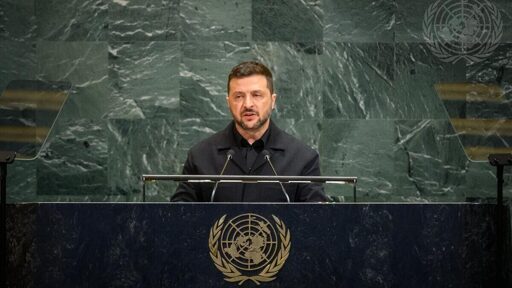At the United Nations General Assembly (UNGA), European leaders cast the European Union as a beacon of acceptance and stability. European Council President António Costa, for example, claimed the EU is “a project of peace, of reconciliation, of social justice.” Similar rhetoric was echoed by French and other officials, who spoke of Europe’s “concrete” contributions to building a just and stable world. To at least some in the room, their remarks must have sounded paradoxical, given that most of these leaders champion extensive armament at home.
Read more: Iran will “never seek to build a nuclear bomb,” declares president at UNGA
Belgian Prime Minister Bart De Wever praised his government’s decision to increase so-called defense spending – a policy direction contested by tens of thousands in Brussels this year – and declared that “those who wish for peace must be prepared to defend it.”
Ukrainian President Volodymyr Zelenskyy followed a similar logic in his speech which focused on militarization and preparation for war. “Today, no one but ourselves can guarantee security. Only strong alliances. Only strong partners. And only our own weapons,” he said. “International law doesn’t work fully unless you have powerful friends who are truly willing to stand up for it. And even that doesn’t work without weapons […] There are no security guarantees except friends and weapons.”
Similar to previous years, the war in Ukraine dominated European interventions, yet few offered a genuine vision for a peaceful future. Instead, speeches largely boiled down to denunciations of Russia. In this context, Russian officials unsurprisingly seized the chance to highlight the West’s responsibility for diplomatic failure. At a G20 meeting held alongside UNGA, Russian Foreign Minister Sergey Lavrov claimed the “crisis in Ukraine” was fueled by the West, insisting that “NATO and the EU have transformed [it] into a direct war against my country, actively participating in it.”
Betrayal of the UN Charter
Lavrov also accused certain UN members of betraying the Charter’s principles, exposing “neo-colonial ambitions, fueling global instability and multiplying regional conflicts.” The same powers, he said, had previously drawn the borders of African countries “literally with a ruler.” He added that unilateral sanctions and tariff wars “not only strike at the most vulnerable and unprotected groups of population but also pose a serious threat to the global economy.”
In contrast, EU leaders devoted little attention to the legacy of Western colonialism. Costa’s speech, for instance, erased distinctions between former colonial powers and the rest of the world. “In today’s multipolar world, there is no Global South and Global North – both are plural,” he claimed.
Short of political courage, not opinions
Israel’s genocide in Gaza – though mostly not addressed in those terms – was another recurring theme. But here too European leaders seemed more interested in symbolic gestures than concrete action. A much-publicized wave of European recognition of Palestinian statehood was touted by quite a few in New York, yet the vision these politicians offered remained (at best) firmly tied to a two-state solution conditional on the dismantling of Hamas. French President Emmanuel Macron extended this presumption of deciding who may participate in other regions’ political life to Lebanon, remarking that the country “breathes more freely when Hezbollah is weakened.”
Read more: “Humanity must stop the genocide in Gaza”: Petro’s radical speech at the UN General Assembly
Some representatives from countries that have taken bolder administrative steps in response to Israel’s attacks on Gaza delivered more substantive speeches. Slovenian President Nataša Pirc Musar told the assembly: “We should do the right thing. We did not stop the Holocaust, we did not stop the genocide in Rwanda, we did not stop the genocide in Srebrenica. We must stop the genocide in Gaza. There are no excuses anymore. None.” Shortly afterward, Slovenia introduced sanctions on Israeli Prime Minister Benjamin Netanyahu, wanted by the International Criminal Court on war crimes charges.
However, Europe’s contributions to the UNGA were mostly limited to general declarations. The absence of real commitments was effectively summarized by Croatian President Zoran Milanović: “The world is not short of strategies, reports or debates. What it lacks is political courage.” That observation, at least, applied perfectly to European leaders’ participation at the UN forum.
The post European leaders at UNGA: more armament, no meaningful move on Gaza genocide appeared first on Peoples Dispatch.
From Peoples Dispatch via this RSS feed


